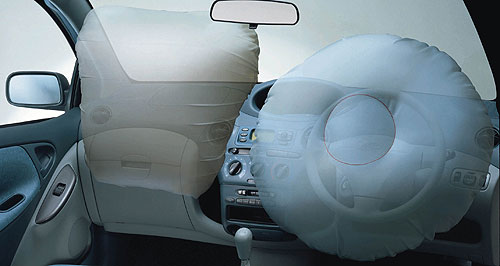Make / Model Search
News - ToyotaNRMA calls for calm in fake airbag parts scandalSpiral out of control: Toyota has reportedly issued an alert about counterfeit and potentially faulty replacement spiral connectors that might fail to fire a driver’s airbags in a crash. Motoring club plays down likelihood of risk amid reports of fake Toyota airbag parts5 Aug 2015 NEW South Wales motoring club NRMA has moved to allay the concerns of motorists in light of the counterfeit Toyota airbag parts scandal reported by News Corp this week. According to the report, Toyota Australia has issued a bulletin to all dealers alerting them to the discovery of counterfeit spiral cables, which deliver power to the driver’s airbag firing mechanism and must be replaced along with the airbag itself following the safety device’s deployment in a crash. It says the fake parts – marketed both as genuine Toyota items and aftermarket parts supplied in counterfeit Toyota packaging – are being sold by two identified suppliers to independent repairers and possibly Toyota dealerships who believe they are the real thing. Despite the report saying Toyota is hunting down “thousands” of fake parts, a notice on the NRMA website quotes the club’s vehicle safety expert Jack Haley as casting doubts on the likelihood that many motorists would be affected because they are only fitted when an airbag is replaced. “Replacing airbags is rare – if the airbags go off, the vehicle is usually a write-off,” he said. The News Corp report cites insurance industry figures suggesting that around 15 per cent of crashes are serious enough for airbags to be deployed, meaning at least 150,000 cars need their airbags replacing in Australia each year. GoAuto has so far been unable to verify these figures with the Australian insurance industry, or what proportion of cars are repaired and returned to the roads with new airbags. Mr Haley also doubted the parts would have reached the parts shelves of franchised Toyota dealers. “It is difficult to understand how Toyota dealers would be stocking counterfeit parts: they would normally order their stock from the warehouse (but) independent repairers may have purchased the parts,” he said. “If anyone has a vehicle that they know has had the airbag replaced, they can have it checked by a Toyota dealer – we don’t know if Toyota will cover the cost of this.” A Toyota spokesperson confirmed to the NRMA that dealerships used only genuine parts. The NRMA has also invited Toyota owners who have had their vehicle’s airbags replaced to contact its motoring advice team on 13 11 22. News Corp reports that the dealer bulletin says the bogus spiral cables – said to be priced as low as $50 compared with the $300 charged for genuine items – have been found to pose “significant risk of airbag non deployment in an accident” due to the “high likelihood of insufficient conductivity to support airbag deployment electrical current”. Problems reportedly found with the fake components during assessment by Toyota in Japan include a lack of gold-plated connectors, use of a material other than copper for wiring, poor cable crimping and poorly formed or misaligned plastic locking tabs. Toyota’s bulletin recommends dealers to check spiral cables as part of routine servicing – but as the fake parts are said to fit most of the brand’s models sold in Australia during the past decade, many will have drifted outside of the dealer service network and therefore Toyota’s control. News of the airbag scandal broke just days after the Federal Chamber of Automotive Industries (FCAI) issued a media release highlighting the risks of counterfeit parts – with “misfiring airbags” cited as an example of the potential problems associated with their use. Since June 1 this year, the FCAI has run a “Genuine is Best” campaign and website extolling the virtues genuine parts to motorists. Counterfeit Toyota parts – this time oil filters – were central to last week’s FCAI media release which highlighted the Australian Border Force’s seizure of a shipment containing “hundreds” of fakes. FCAI chief executive Tony Weber said “the easiest and best way to tell if it is a genuine part is if it has come through the vehicle maker’s authorised supply chain”. “Unlike these counterfeits – a genuine part is made or selected by the maker of your car or motorcycle and tested by that maker for quality and safety. A genuine part ensures your vehicle drives, functions and protects you the way it was intended by the manufacturer of that vehicle.” A statement from the Department of Infrastructure and Regional Development said it is “working with Toyota and the ACCC to ascertain whether the part in question poses a safety risk and will advise ACCC accordingly”. “The issue of the allegedly counterfeit nature of the part could also be a matter for the ACCC, should investigation lead to identification of false or misleading claims made about or safety issues with the part.” This latest airbag scandal is unrelated to the Takata recall fiasco, in which more than 800,000 Australian-delivered cars are caught up as part of a world-wide scare involving 53 million vehicles, at least half a dozen deaths and more than a hundred injuries caused by shrapnel ejected from ageing airbag detonators.  Read more1st of July 2015  Takata airbag recalls burst past 800K in OzMore Toyota and Lexus, plus private-importers Performax, blow the number past 800K10th of June 2015  200,000 more vehicles caught up in airbag recallTakata airbag safety recall balloons as Japanese manufacturers issue more notices |
Click to shareToyota articlesResearch Toyota Motor industry news |











Facebook Twitter Instagram